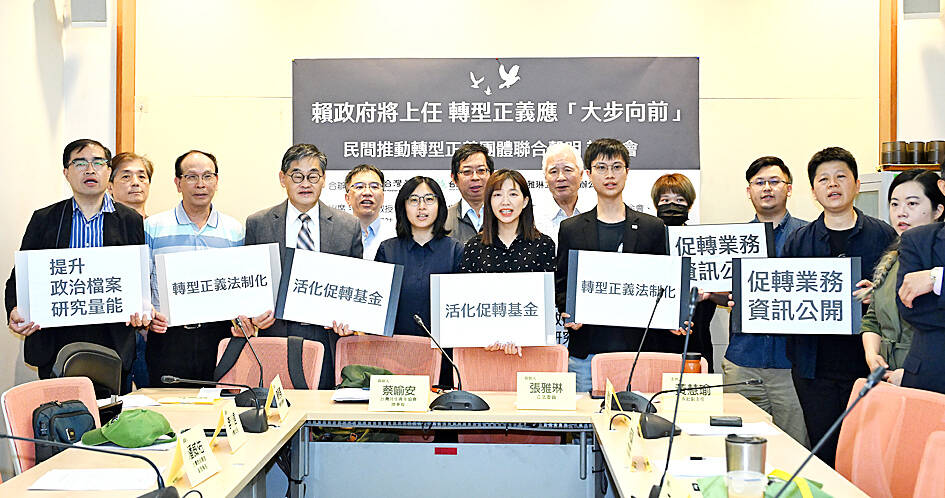An alliance of civic groups yesterday called on the incoming administration of president-elect William Lai (賴清德) to introduce legislation to address injustices perpetrated by the government during Taiwan’s authoritarian era, thereby facilitating efforts to realize transitional justice.
President Tsai Ing-wen (蔡英文) is leaving office soon, but the Cabinet has not yet delivered several pieces of major legislation regarding transitional justice, Taiwan Forever Association deputy director Huang Hui-yu (黃慧瑜) told a news conference in Taipei, adding that Tsai had pledged that they would be passed by the end of last year.
As the new president, it is Lai’s duty to inform the public whether he intends to pick up from where the Tsai administration left off and finalize the work to accomplish transitional justice in his first term, Huang said.

The pending bills include a draft bill to push forward national transitional justice, a draft bill on the preservation of historical sites of injustice and a draft bill on the identification and disposition of perpetrators, Huang said.
In addition, the Cabinet has not yet made known its decision on whether to amend or repeal the Organization Act of National Chiang Kai-shek Memorial Management Office (國立中正紀念堂管理處組織法), she said, referring to calls from the public to remove the giant statue of Chiang Kai-shek (蔣中正) from the memorial hall in Taipei dedicated to the former president.
Meanwhile, the Ministry of Culture, which oversees the hall’s management office, should begin work to transform the hall, which would not require legislation — for example, by shuttering the hall and canceling the nine daily “changing of the guard” ceremonies, she said.
Those demands were part of a joint statement signed by more than 30 civic groups calling for the new administration to step up efforts to push for transitional justice.
Democratic Progressive Party (DPP) Legislator Ngalim Tiunn (張雅琳) said that the DPP caucus is outnumbered by opposition lawmakers in the legislature.
Popular demand would therefore be key to passing legislation promoting transitional justice, she said.
Taiwan Association of University Professors head Chen Li-fu (陳俐甫) asked the DPP to refrain from using its lack of a legislative majority as an excuse for inaction over transitional justice.
The DPP also had a legislative minority under former president Chen Shui-bian (陳水扁), but it was much more vocal in its demand for transitional justice than it is now, Chen Li-fu said.
Lai was one of the DPP members who was vocal in advocaing for past government-perpetrated injustices to be redressed before the party came into power, and he should work to reconnect the party with its roots, Chen Li-fu said.

Beijing could eventually see a full amphibious invasion of Taiwan as the only "prudent" way to bring about unification, the US Department of Defense said in a newly released annual report to Congress. The Pentagon's "Annual Report to Congress: Military and Security Developments Involving the People's Republic of China 2025," was in many ways similar to last year’s report but reorganized the analysis of the options China has to take over Taiwan. Generally, according to the report, Chinese leaders view the People's Liberation Army's (PLA) capabilities for a Taiwan campaign as improving, but they remain uncertain about its readiness to successfully seize

Taiwan is getting a day off on Christmas for the first time in 25 years. The change comes after opposition parties passed a law earlier this year to add or restore five public holidays, including Constitution Day, which falls on today, Dec. 25. The day marks the 1947 adoption of the constitution of the Republic of China, as the government in Taipei is formally known. Back then the Chinese Nationalist Party (KMT) governed China from Nanjing. When the KMT, now an opposition party in Taiwan, passed the legislation on holidays, it said that they would help “commemorate the history of national development.” That

Taiwan has overtaken South Korea this year in per capita income for the first time in 23 years, IMF data showed. Per capita income is a nation’s GDP divided by the total population, used to compare average wealth levels across countries. Taiwan also beat Japan this year on per capita income, after surpassing it for the first time last year, US magazine Newsweek reported yesterday. Across Asia, Taiwan ranked fourth for per capita income at US$37,827 this year due to sustained economic growth, the report said. In the top three spots were Singapore, Macau and Hong Kong, it said. South

Snow fell on Yushan (Jade Mountain, 玉山) yesterday morning as a continental cold air mass sent temperatures below freezing on Taiwan’s tallest peak, the Central Weather Administration (CWA) said. Snowflakes were seen on Yushan’s north peak from 6:28am to 6:38am, but they did not fully cover the ground and no accumulation was recorded, the CWA said. As of 7:42am, the lowest temperature recorded across Taiwan was minus-5.5°C at Yushan’s Fengkou observatory and minus-4.7°C at the Yushan observatory, CWA data showed. On Hehuanshan (合歡山) in Nantou County, a low of 1.3°C was recorded at 6:39pm, when ice pellets fell at Songsyue Lodge (松雪樓), a